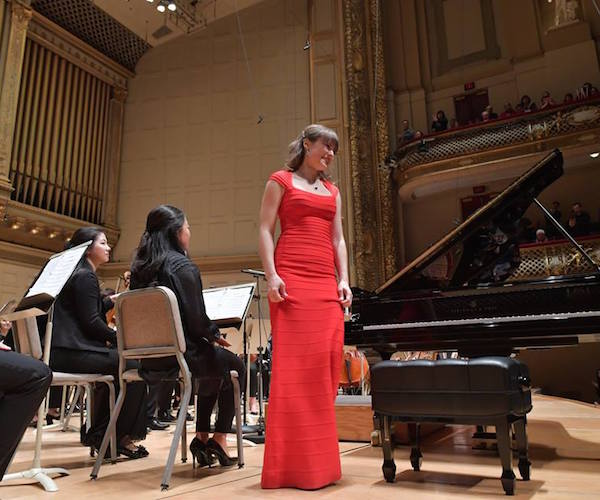Concert Review: Boston Philharmonic Youth Orchestra at Symphony Hall
By Jonathan Blumhofer
Without question, this BPYO rendition of Shostakovich Ten was one of the most urgent and necessary of any symphonic score I’ve heard all year.

Pianist Anna Fedorova with the Boston Philharmonic Youth Orchestra. Photo: Paul Marotta.
The Boston Philharmonic Youth Orchestra (BPYO) returned to action on Sunday afternoon with a matinee at Symphony Hall. Founder and conductor Benjamin Zander was on the podium, leading a pair of 20th-century warhorses by Sergei Rachmaninoff and Dmitri Shostakovich, plus an overture by Carl Maria von Weber.
The Rachmaninoff in question was the Piano Concerto no. 2. Written at the turn of the last century, it’s a flawless piece, one that perfectly balances virtuosity and introspection, melodic invention, striking instrumentation, and a sweeping sense of dramatic progression.
Sunday’s soloist was the young pianist Anna Fedorova, a keyboardist whose technical arsenal is as impressive as one might expect. On top of that, she’s a crackerjack musician.
Playing with crystalline, bell-like tone, Fedorova dispatched the Herculean solo part with energy and grace. Throughout, her playing was beautifully voiced: the melodic line was consistently showcased, yes, but the solo line’s busy layers of filigree and counterpoint were never blurred and always spoke with purpose.
So, too, did the Concerto’s shifting moods. Fedorova drew textures of shimmering delicacy from her instrument at the start of the second movement and potently captured the finale’s mix of impetuosity and dreaminess. The music’s dynamic range — from the first movement’s resounding arpeggios to the second-movement cadenza’s pianississimo conclusion — was, likewise, stylishly realized.
Zander led the BPYO in an accompaniment that was lively and taut in the outer movements, warm and serene in the middle one. Nick Auer’s horn solos and Diego Bacigalupe’s clarinet solos anchored some excellent ensemble playing from the brass and woodwinds, while the whole ensemble seemed to revel in Rachmaninoff’s stirringly lyrical writing.
Afterwards, Fedorova gave an encore of Rachmaninoff’s song, “Ne poi krasavitsa,” in which she accompanied not a singer, but her fiancée, double bassist Nicholas Schwartz.
Following intermission came Shostakovich’s Symphony no. 10.
Written in the immediate aftermath of Stalin’s death in 1953, it’s a piece that explores some of the darkest, most chilling recesses of the human experience, as narrated by the composer himself (Shostakovich’s initials, DSCH — D, E-flat, C, B-natural — figure as one of the work’s prominent motives). Accordingly, there’s a case to be made that it be the exclusive province of jaded, seasoned adults. Sunday’s reading partly demonstrated why: the BPYO’s wasn’t the most sardonic account on record or the most brutally intense.
At the same time, though, theirs didn’t lack for subtlety or force. The furious climaxes of the first movement, for instance, were unleashed with tremendous power. And the third movement, with its cryptic mottos, was pristinely shaped and brimmed with character.
No, the strengths this young orchestra brought to this very adult piece more than compensated for any fleeting moments of naïve indiscretion. Their greatest asset was, in fact, their flexibility and responsiveness to Zander’s leading.
And his interpretation of this mighty score was striking for its emotional directness and intuitive sense of rightness. How’d Zander do it? In a word, he got everything to dance.
A pair of waltzes — macabre and sometimes terrifying in the first movement, ambiguous and clouded in the third — anchored the whole piece. Around them came the grotesque savagery of the second-movement scherzo which, on Sunday, sounded like demented cartoon music: say, “Itchy and Scratchy” meets Alice in Wonderland in Hell. The finale’s circus-like refrains were bright and fresh, to be sure, but they were also easily clouded, and, in this context, that made the final, thundering iterations of the DSCH motive into statements of genuine, hard-won triumph. Without question, this BPYO rendition of Shostakovich Ten was one of the most urgent and necessary of any symphonic score I’ve heard all year.
Still, it had some quirks. The BPYO’s sound was, in the first movement, sometimes a bit lighter and brighter than what you usually encounter in this piece. But it was always transparent, never sounding scrawny, shrill, or forced. The low woodwinds spoke with conspicuous purity, while Paul Mardy’s clarinet solos were a first-movement highlight.
Allison Parramore, filling in on short notice as the concert’s principal flute, made lovely work of her turns in the outer movements, and Elias Medina’s oboe solos in the finale were ideally plangent. Also fine were Thomas Ossi’s horn solos in the third movement, which sang with ruddy nobility.
To kick off the afternoon, Zander presided over an ebullient, slightly brash performance of Weber’s Euryanthe Overture. The BPYO’s was, essentially, a Germanic rendition of the piece – offering lots of good, weighty bass projection — but not one that got bogged down in the mud. The slow second theme was shaped with care and its reprise at work’s apex swooned. If some of the fugal textures got a bit fuzzy, well, that marked no big loss: the score’s overriding disposition was of exuberant, unalloyed joie de vivre.
Jonathan Blumhofer is a composer and violist who has been active in the greater Boston area since 2004. His music has received numerous awards and been performed by various ensembles, including the American Composers Orchestra, Kiev Philharmonic, Camerata Chicago, Xanthos Ensemble, and Juventas New Music Group. Since receiving his doctorate from Boston University in 2010, Jon has taught at Clark University, Worcester Polytechnic Institute, and online for the University of Phoenix, in addition to writing music criticism for the Worcester Telegram & Gazette.

I love the knowing detail in this review, and am old enough to remember when Boston’s newspaper of record would frequently favor its readers with reviews of this depth. Now it seems to be a sometime thing.
Thanks — Jonathan Blumhofer does a really fine job. And yes, when it comes to arts coverage, and not just of classical music, the Boston Globe has very much become a “sometime thing.”